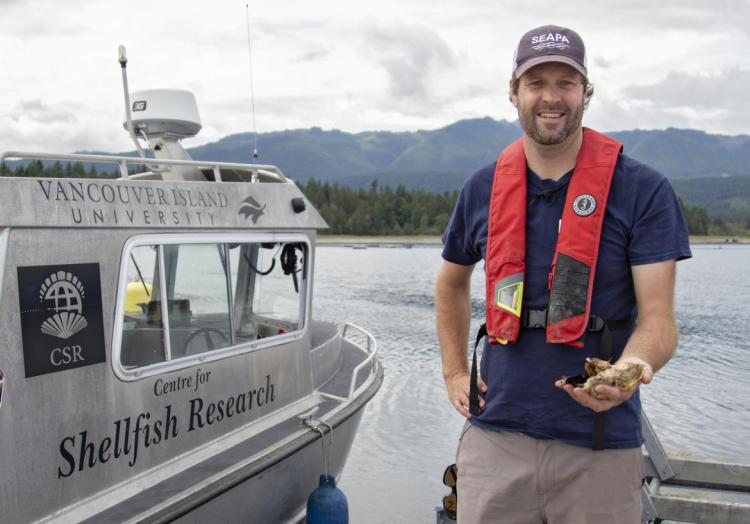
Dr. Timothy Green, VIU's Canada Research Chair in Shellfish Health and Genomics, is working with researchers from the Department of Fisheries and Oceans to breed an oyster more resilient to ocean acidification
Ocean acidification is negatively changing the way oysters grow their shells. Shells are thinner, leaving oysters more vulnerable and resulting in their deaths.
Shellfish are an integral part of BC's aquaculture sector and important for Canada's food security. Oysters are considered one of the most vulnerable animals to ocean acidification, explained Dr. Timothy Green, Vancouver Island University's (VIU's) Canada Research Chair in Shellfish Health and Genomics.
Ocean acidification occurs when ocean waters absorb carbon dioxide, which changes the water's pH balance. Lower pH means less carbonate, which oysters use to build their shells. The acidification means shells become thinner and can increase the death rates of oysters.
"When we started the BC oyster breeding program, four out of every five oysters died before harvest, meaning farmers lost 80 per cent of their crop. Now that's down to 20 per cent, so that's potentially millions of extra dollars into the BC economy," said Green. "Oysters are high-quality animal protein that don't have environmental impacts such as other protein sources like beef or pork."
Green and his research team have spent the past few years future-proofing shellfish, which includes making them more resilient to environmental stressors and disease. Green is collaborating on a project to make them more resilient to ocean acidification with the BC Shellfish Growers Association and Drs. Chris Pearce and Clara Mackenzie from the Department of Fisheries and Oceans (DFO), working out of the Pacific Biological Station (PBS).
"Improving the resiliency of marine species to environmental stressors is a high priority for DFO. Our collaboration with Dr. Green is a great example of how a scientific approach can support the development of practical solutions for real-world problems like climate change," said Mackenzie.
The researchers will examine the genetics of oyster families in their breeding program. They hope to identify genes that protect oysters against ocean acidification. Once those genes are identified, the researchers can accelerate their breeding program efforts.
"DFO's climate change laboratory at PBS provides the unique opportunity to examine the response of oysters to ocean acidification conditions in a controlled environment. It is ideal for testing whether oysters selected for ocean acidification resiliency can really deliver," said Mackenzie.
Green said well-run oyster farms have many environmental benefits. Oysters filter seawater to remove particles, which allows sunlight to reach deeper into the water. This promotes the growth of kelp and eelgrass, which are important habitats for fish and other organisms. Oysters and their associated farming equipment also make habitat for a wide range of marine organisms, such as sea stars, crabs and nudibranchs.
Green received a Climate Ready BC Seafood Program grant from the Tula Foundation to conduct the research.












